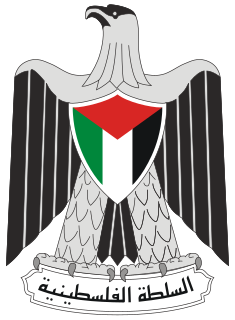
The Knesset is the unicameral national legislature of Israel. As the legislative branch of the Israeli government, the Knesset passes all laws, elects the President and Prime Minister, approves the cabinet, and supervises the work of the government. In addition, the Knesset elects the State Comptroller. It also has the power to waive the immunity of its members, remove the President and the State Comptroller from office, dissolve the government in a constructive vote of no confidence, and to dissolve itself and call new elections. The Prime Minister may also dissolve the Knesset. However, until an election is completed, the Knesset maintains authority in its current composition. The Knesset is located in Givat Ram, Jerusalem. The Knesset was temporarily dissolved on 30 May 2019.

Elections for the Palestinian National Authority (PNA) were held in Palestinian Autonomous areas from 1994 until their transition into the State of Palestine in 2013. Elections were scheduled to be held in 2009, but was postponed because of the Fatah–Hamas conflict. President Mahmoud Abbas agreed to stay on until the next election, but he is recognized as president only in the West Bank and not by Hamas in Gaza. The Palestinian National Authority has held several elections in the Palestinian territories, including elections for president, the legislature and local councils. The PNA has a multi-party system, with numerous parties. In this system, Fatah is the dominant party.
The Government of Israel exercises executive authority in the State of Israel. It consists of ministers who are chosen and led by the prime minister. The composition of the government must be approved by a vote of confidence in the Knesset. Under Israeli law, the prime minister may dismiss members of the government, but must do so in writing, and new appointees must be approved by the Knesset. Most ministers lead ministries, though some are ministers without portfolio. Most ministers are members of the Knesset, though only the Prime Minister and the "designated acting prime minister" are required to be Knesset members. Some ministers are also called deputy and vice prime ministers. Unlike the designated acting prime minister, these roles have no statutory meanings. The government operates in accordance with the Basic Law. It meets on Sundays weekly in Jerusalem. There may be additional meetings if circumstances require it. The prime minister convenes these meetings. On 30 May 2019, a vote was passed to temporarily dissolve the Knesset until the September election.
Legislative elections were held in Israel on 3 November 1959 to elect the 120 members of the fourth Knesset. Mapai remained the dominant party, gaining seven seats. Following the elections, Mapai leader David Ben-Gurion formed ninth government on 17 December 1959. His coalition included the National Religious Party, Mapam, Ahdut HaAvoda, the Progressive Party and the three Israeli Arab parties, Progress and Development, Cooperation and Brotherhood and Agriculture and Development. The government had 16 ministers. Mapai's Kadish Luz became the Speaker of the Knesset.

The Jewish Home is an Orthodox Jewish and religious Zionist political party in Israel. It was originally formed by a merger of the National Religious Party, Moledet, and Tkuma in November 2008. However, Moledet broke away from the party after its top representative was placed only 17th on the new party's list for the 2009 Knesset elections, and instead ran on a joint list with Hatikva. Tkuma later also left to join the National Union.

Miki Haimovich is a television presenter and an Israeli politician. She was elected to the Knesset in the April 2019 Israeli legislative election as a member of the Israel Resilience Party, a part of the Blue and White alliance.

The Eighth constituency for French residents overseas is one of eleven constituencies each electing one representative of French citizens overseas to the French National Assembly.

Otzma Yehudit is a far-right political party in Israel, which has been referred to as Kahanist and anti-Arab. It was originally formed as Otzma LeYisrael, and was established on 13 November 2012 by MKs Aryeh Eldad and Michael Ben-Ari, who split from the National Union to form a new party ahead of the 2013 elections.

The Palestinian Legislative Council (PLC) is the unicameral legislature of the Palestinian Authority, elected by the Palestinian residents of the Palestinian territories of the West Bank and Gaza Strip. It currently comprises 132 members, elected from 16 electoral districts of the Palestinian Authority. The PLC has a quorum requirement of two-thirds, and since 2006 Hamas and Hamas-affiliated members have held 74 of the 132 seats in the PLC.

Meretz is a left-wing, social-democratic and green political party in Israel. The party was originally formed in 1992 with the union of Ratz, Mapam and Shinui, and was at its peak in the 13th Knesset between 1992 and 1996, during which it held 12 seats. In the April 2019 elections, the party won four seats.
The following lists events in the year 2019 in Israel.

Omer Yankelevich is an Israeli attorney, educator, and social activist. She is a co-founder of the "Just Begun Foundation", which sponsors social initiatives to help integrate peripheral and marginalized populations in Israel, with an emphasis on the Haredi sector. In 2019, she joined the Israel Resilience Party, which is part of the Blue and White political alliance, and was placed #23 on the faction's list for the April 2019 Knesset election. The Blue and White alliance gained 35 seats in the election, resulting in Yankelevich becoming a Member of the Knesset.

Yariv Oppenheimer is a left-wing Israeli activist and politician. He was the director of Peace Now, for a year and a half until his resignation in April 2016, reportedly due to internal struggles.
The next legislative elections is expected to be held in Israel sometime during the early 2020s. The first mention of the possibility of having it was on 17 September 2019, when Likud MK Yoav Kisch stated that "that if Binyamin Netanyahu does not head the next government, Israel will go to elections for the third time."
Annexation of the West Bank, or parts thereof, has been proposed by some Israeli politicians since the area was captured and occupied by Israel during the 1967 Six-Day War.

Noam is an Orthodox Jewish religious, right-wing political party in Israel, established in July 2019 by a very conservative faction in the Religious Zionist community inspired by Rabbi Zvi Thau and his Har Hamor Yeshiva. The party's goal is to advance policies against LGBT rights and what its backers have called "the destruction of the family".

The Secular Right is a hiloni nationalist political party in Israel. It was formed by Tiberias mayor Ron Cobi in June 2019.











